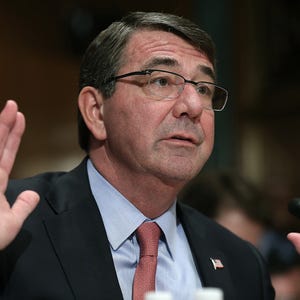For all intents and purposes, the majority of ‘moderate’ rebels’ are the same militants that cross the border and then call themselves ISIS fighters. That is easily seen in cases like the Toyota truck incident, where we gave these ‘moderates’ 43 Toyota Hiluxes that ended up in ISIS hands.
And this monthly stipend? Well, that’s been going on a while. We reported on Obama paying thousands of militants $150/month almost a year ago. And recently, an ISIS leader arrested in Pakistan admitted that ISIS is being funded by the U.S. government.
About 6,000 Syrians have volunteered for the training program, more than 4,000 of them awaiting to be vetted, Smith said. Recruiting continues.
The effort to field competent, trained forces in Iraq to battle militants from the Islamic State, known as ISIL and ISIS, has also been slow. ISIL swept through northern Iraq and large portions of eastern Syria last summer, seizing key cities. Iraqi forces have succeeded in taking back some of them, including Tikrit, but were chased without a fight from Ramadi last month.
The Pentagon had hoped to field 24,000 new Iraqi security forces by fall, Carter told Congress last week. But will fall short of that mark because 9,000 had signed up to train.
The Syrian moderates will be equipped with small arms and trained to maneuver and communicate. Their primary mission will be to protect their towns and villages from ISIL fighters. Eventually, they are also envisioned to become a viable opposition to the regime of President Bashar Assad. Civil war has shattered the country, killing 220,000 people and forcing millions from their homes.
Carter also acknowledged last week that the effort to field thousands of trained Syrian moderates has gone slower than expected.
“Our train-and-equip mission in Syria has been challenging,” he said. “But the requirement for a capable and motivated counter-ISIL ground force there also means we must persist in our efforts.”
Even a small force, if well trained, could make a difference in Syria, said David Phillips, director of the Peace-Building and Rights Program at Columbia University.
“They’re not fighting a large army,” Phillips said. “Even small numbers can be effective on the battlefield. Nobody envisions this to be an easy or quick win. Developing a nucleus of capable fighters is the right way to start.”


LOL, They took the $400 and took off for Germany. LOL
Very stupid.
http://pamelageller.com/2015/09/the-islamic-state-had-warned-europe-they-would-send-500000-migrants-as-weapon.html/
Liberal logic at its best
So the Pentagon is paying new ISIS recruits $400 a month. ISIS leaders have been laughing and saying Obama is doing this but AMERICA WILL NOT LISTEN.
stupid politicians
money comes and goes….but killing each other….priceless
WTF?
CIA pay Isis to take out $#%&!@*ad so the KHAZARIAN MAFIA in Israel can take control of entire mid east